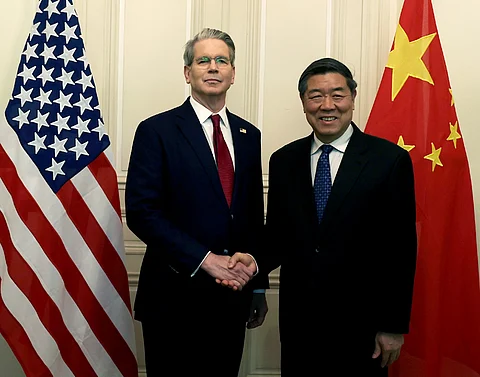

China has firmly rejected U.S. President Donald Trump’s 10-day ultimatum to cease purchasing Russian energy or face 100% tariffs.
The warning was issued during a two-day summit in Stockholm between American and Chinese officials, where both sides also agreed to extend their 90-day tariff truce for an additional 90 days. The U.S. delegation, led by Treasury Secretary Scott Bessent, reportedly warned Chinese negotiators of the consequences should Beijing continue energy imports from Russia.
According to multiple media reports and Bessent’s own remarks, Chinese officials dismissed the threat outright. Speaking to reporters in Stockholm on Tuesday, Bessent said, “The Chinese take their sovereignty very seriously. We don’t want to impede on their sovereignty, so they’d like to pay a 100% tariff.” He also quoted a Chinese official as stating, “China is a sovereign state with its own energy needs, and oil purchases will be determined by the country's domestic policy.”
Trump had originally issued a 50-day ultimatum on July 7 for Russia to end its war in Ukraine or risk global penalties on its energy buyers. On Monday, during the first day of trade talks, Trump shortened the deadline to 10–12 days, and on Tuesday confirmed it would expire in 10 days.
Reactions from Moscow and Beijing have been dismissive. Russian officials have largely declined to comment, while Chinese negotiators proceeded with the tariff extension deal despite the warning.
On Wednesday, Trump announced a 25% tariff on India—a significant Russian energy buyer—to take effect on Friday, including an additional penalty for continued purchases of Russian energy.
Analysts, however, expressed skepticism that Trump would enforce similar tariffs on China. Doing so would override the May 12 agreement that capped U.S. tariffs on Chinese imports at 30%, potentially reigniting the trade war and destabilizing global markets once again.
Any escalation, such as reimposing the peak April 2025 tariffs—when U.S. levies on Chinese goods reached 145%—would likely undermine current trade diplomacy and diminish chances for a future agreement. It could also severely impact U.S. markets, particularly the bond sector, which is vital for servicing national debt.
Trump has publicly acknowledged that additional tariffs or sanctions might not significantly affect Russia. He also admitted that if global energy markets are disrupted, he may order increased U.S. energy production—a statement that suggests uncertainty over the potential effectiveness of his new policy approach.